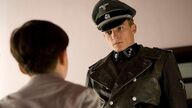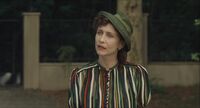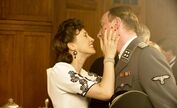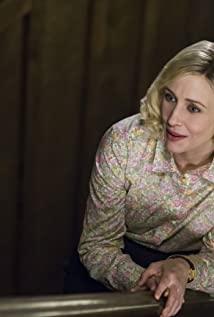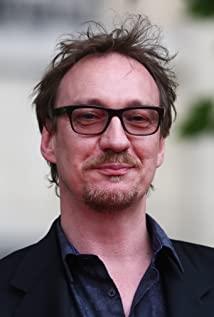a World War II film with a unique style and perspective. This film is an adaptation of a novel, which basically follows the style of the original novel. With more than 80 minutes of delicate foreshadowing, it leads to a heart-piercing tragic ending. Pain, condemnation, tears of anger were inevitable, and all the emotions of the World War II era struck again. In addition to the heartache, I still want to calmly talk about my own point of view.
Comparing the innocence of children with the ugly and cruelty of war, so as to cause strong emotional ups and downs of moviegoers, is a common technique used in war-themed films. In the smog of war, in the dark years when human nature was distorted, fragile little lives were devastated and ravaged, and then fell into the mud, we can immediately think of the little girl in red in "Schindler's List".
And this film takes this approach to the extreme.
The whole story basically clearly shows a kind of effect in which the world of children and the world of adults are opposed to each other and set off each other. For example, at the beginning of the film, the golden sunset spreads all over the streets of Berlin. Little Bruno and his friends spread their hands in a fighter-like shape, chasing and chasing among the pedestrians, a warm and happy scene. However, viewers can see the purpose of this. In the eyes of ignorant children, the weapons that adults use to make killing are the sustenance for their own play. The real world and the innocent world meet for the first time here. Sure enough, the camera follows Bruno's fighter jets past the ghetto, and we see the Nazis driving the Jews onto the big truck. Where the truck is going, we know, but Bruno doesn't know, just tilts his head curiously, then flies away again.
Later, little Bruno mistook the concentration camp for a farm and the prison uniform for striped pajamas. After watching the propaganda film about the concentration camp that the Nazis used to deceive the people, he also believed it. Even when he was finally put in the gas chamber, he still naively thought they were just going to take a shower.
Whenever little Bruno came across something that was cruel in the real world, he always understood it as pure and beautiful. Coupled with the big blue and pure eyes of the little boy, as well as his wit, kindness and bravery, all of which make the audience feel pity and love. That's it, using the best in the world - innocence, and the ugliest - war, and repeatedly confrontation, the adults' lies will become more absurd, the Nazis' actions will be more dehumanizing, and the war will be completely washed away. All kinds of excuses are just a beast, with a ferocious face, unsightly.
In this regard, the film is dedicated and effective, as evidenced by my tears while watching it and the lingering heartache after watching it. However, why does this film give people a feeling that it is not thorough enough and lacks convincing? Bruno's friendship with the boy in striped pajamas is handled a bit hastily, and finally Bruno's crawling into the concentration camp is a bit abrupt, so that some viewers even wonder if the Jewish children deliberately tricked Bruno into it.
It's not surprising that viewers who haven't read the original feel this way. In the original book, most of the stories are told from the perspective of children, and the film also has this intention. The whole film is filled with the poetry and gentleness of a typical British film, with bright colors and a melodious soundtrack. But it was wartime, and life was supposed to be gray. The reason for shooting like this is to show that this is the world in the eyes of children, and the grass is still growing. That tone is actually pretty good.
Look at the portrayal of other characters. The supporting roles in this film are actually very good. Mom, dad, sister, young military officer, and old Jewish servant are all the most representative characters of that era. Although my mother took a semi-evasive attitude at the beginning, she was kind and upright by nature, and finally refused to join forces with brutality; my father was a Nazi officer who seemed to be an executioner, but he was also in war and had his own helplessness; my sister represented the misguided young people of that era. Humans are victims of mind control; young officers are deeply poisoned by the Nazis and are brutal to Jews, but they still sacrificed themselves in order to save their fathers, and their humanity is not lost; The brutal oppression of the Jewish nation, his goodwill still maintained under the oppression is even more touching and meaningful. . .
With so many representative characters, the director may not want to lose any of them, so he spent more time on the supporting roles during the shooting, so that the foreshadowing was a little too long, leaving less time for Bruno and the Jewish boy, making the film somewhat Being top-heavy makes people feel that the friendship between the two children is a bit far-fetched, as if it existed for the end. If the two children had more scenes and focused on depicting the sincerity of the children under the shadow of war and the trust between them, the ending might be more convincing.
There is one more thing to mention. The perspective of this film was originally a child's perspective. However, when all kinds of supporting characters appear, the director may be afraid that the audience will not understand, and his subjective portrayal will increase. . In this way, the film looks like we are standing outside watching the story of a large family, and the perspective is changed to adults. This may be the reason why the film's artistic style is a little less thorough and unclear. I personally think that if this story is shot from Bruno's point of view, watching everything around you with the eyes of the child, without subjective portrayal and modification, the viewers can experience their own tastes, so that the child's simplicity can be maximized. Let that kind of grass grow to the end, then when the ending comes, the shattering of the fairy tale will come even more shocking.
Of course, this is just my humble opinion, it's my ideal "The Boy in the Striped Pajamas". . .
Last but not least, I appreciate how the last shot of the film was handled. The picture first freezes on the iron gate for a long time, and then slowly pulls back, we see the "striped pajamas" all over the floor. It came to an abrupt end. . .
We didn't see the horror in that door, but the "striped pajamas" on the side of the door were even more shocking. The two little boys who had worn striped pajamas, and the countless lives, passed through the door and disappeared forever, leaving only the "pajamas" full of them lying silently, silently accusing the Nazis of committing crimes. heinous crime. . .
And in front of the screen, our hearts at this moment have also been torn apart by this silent accusation. . . .
View more about The Boy in the Striped Pajamas reviews



